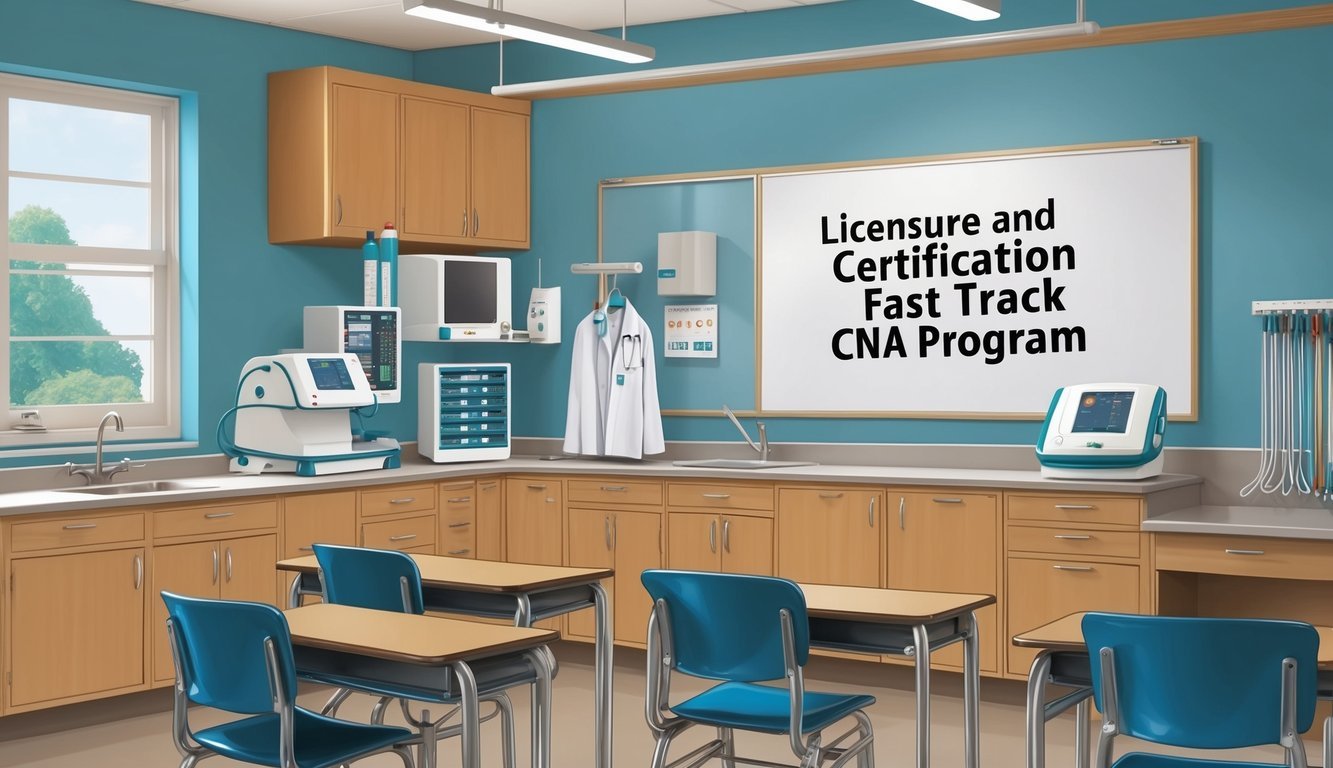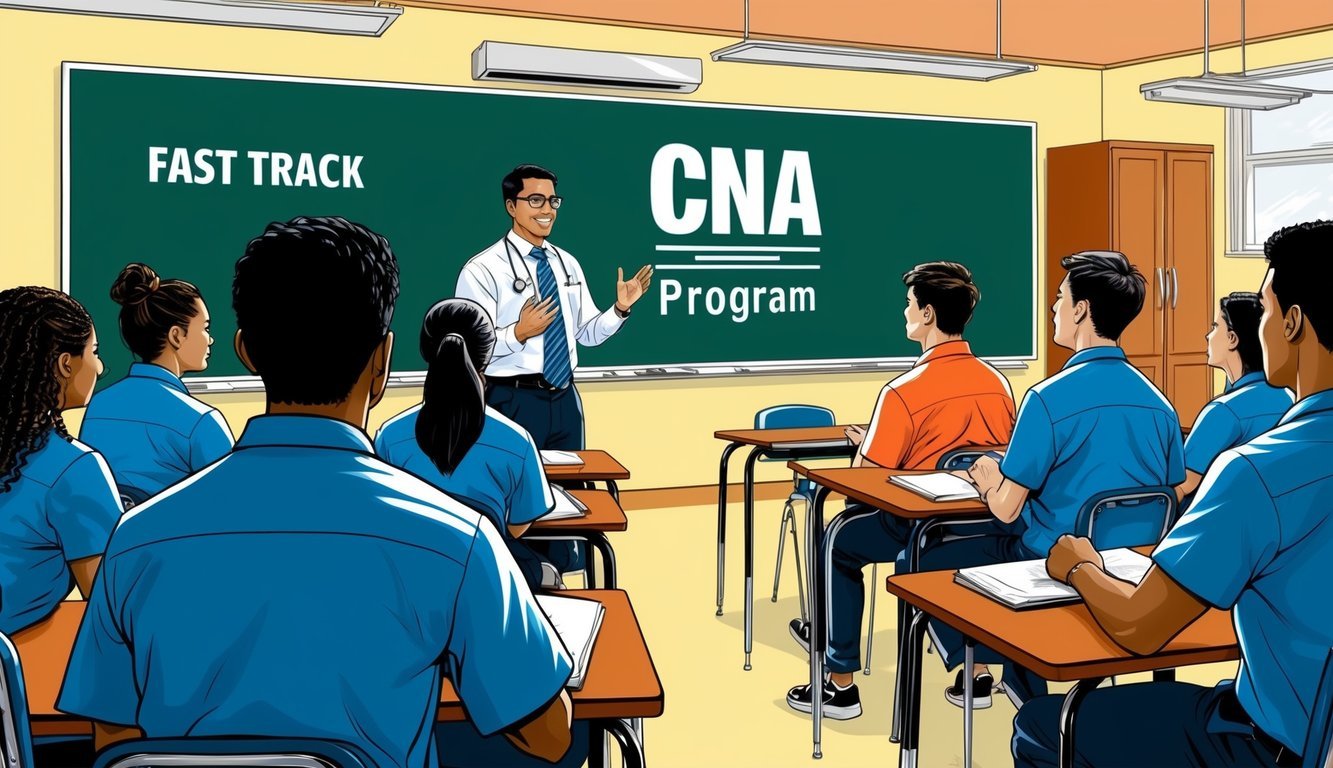Fast track CNA programs offer a rapid path to becoming a Certified Nursing Assistant.
You can complete the training in a matter of weeks, allowing you to start your career in healthcare quickly.
These programs are designed for individuals looking to enter the workforce without spending years in school, making them an appealing option for many.
Many fast track CNA programs include online coursework along with hands-on training.
This combination equips you with essential skills needed in healthcare settings, such as patient care and basic medical procedures.
Understanding the admission requirements and the curriculum will help you choose the right program that aligns with your career goals.
Whether you are seeking a new career or a way to advance in healthcare, fast track CNA programs provide valuable opportunities.
You’ll gain the knowledge and experience needed to succeed and make a real difference in people’s lives.
Key Takeaways
- Fast track CNA programs can be completed in a few weeks.
- Hands-on training is combined with online learning.
- Graduates can quickly enter the healthcare workforce.
Overview of Fast Track CNA Programs
Fast Track CNA programs provide a quick route for individuals to become certified nursing assistants.
These programs are designed to efficiently prepare you for entry into the healthcare field with essential skills and knowledge.
Definition and Scope
Fast Track CNA programs are intensive training courses that often take a few weeks to complete.
They focus on the core competencies you need to work as a certified nursing assistant.
Typically, these programs include both classroom instruction and hands-on clinical training.
You can expect to learn about patient care, safety procedures, and basic medical terminology.
Many of these programs are offered online or in a hybrid format, allowing flexibility.
Programs usually require certain prerequisites, such as basic math and English skills, to ensure you are prepared for the coursework.
Benefits of Fast-Track Programs
Choosing a fast-track program offers several advantages.
First, you can complete your training in a matter of weeks, which means you can start working sooner.
This is ideal if you’re looking to enter the workforce quickly.
Additionally, fast-track programs often have lower tuition costs compared to traditional CNA programs.
Many offer flexible schedules, allowing you to balance your training with other commitments.
With clinical training integrated into the program, you gain real-world experience, which employers value highly.
Fast track programs also enable you to connect with local healthcare facilities, increasing your job placement opportunities.
Summary of Benefits:
- Quick completion time
- Lower tuition costs
- Flexible schedules
- Integrated clinical experience
Admission Requirements and Process
To enroll in a fast-track CNA program, understanding the admission requirements and the application process is crucial.
These steps ensure that you are prepared and meet the necessary qualifications to start your journey in healthcare.
Prerequisites for Enrollment
Before applying, you need to meet several important prerequisites:
- Age Requirement: You must be at least 16 or 17 years old, depending on the program.
- Education: A high school diploma or GED is often required.
- Background Checks: You will need to pass a criminal background check.
- Health Certifications: Immunizations are necessary, including a two-step TB skin test and possibly others.
- Drug Testing: A drug test is typically required to ensure safety in the healthcare environment.
- CPR Certification: Valid CPR certification may also be necessary, especially for clinical placements.
These prerequisites help ensure that candidates are fit for training and working in healthcare.
Application Steps
Once you verify that you meet the prerequisites, you can proceed with the application:
- Gather Documentation: Collect required documents such as your ID, transcripts, and CPR certificate.
- Fill Out the Application: Complete the application form, ensuring all information is accurate.
- Submit Application Fee: Pay any registration fees stipulated by the program.
- Background and Health Checks: Undergo required background checks and submit health records.
- Interview: Some programs may require a personal interview to assess your motivations and suitability.
- Acceptance Notification: After review, you will receive notification about your acceptance status.
Following these steps can help streamline your admission process to become a certified nursing assistant.
Curriculum and Course Structure

The curriculum of a fast track CNA program is designed to equip you with essential skills for patient care and to prepare you for the state certification exam.
This program typically includes core modules, options for hybrid and online learning, and extensive clinical experience.
Core CNA Modules
Core modules in a certified nursing assistant program cover critical nursing skills and personal care skills.
You will study subjects such as:
- Basic Patient Care: Learn how to assist with daily living activities.
- Interpersonal Skills: Develop communication techniques for effective patient interaction.
- Health and Safety Procedures: Understand protocols for infection control and emergency care.
Courses will often include nutrition, anatomy, and physiology to enhance your medical knowledge.
Programs like the one at High Desert Medical College emphasize practical skills alongside theoretical knowledge, making the training comprehensive.
Hybrid and Online Learning Formats
Many fast track CNA programs offer hybrid courses, blending online and in-person classes.
This allows flexibility for your schedule while ensuring that you receive necessary hands-on training.
- Online CNA Programs: These focus on theoretical components, including health regulations and patient rights, allowing you to learn at your pace.
- In-Person Sessions: Required for developing practical skills and competencies necessary for effective patient care.
Some programs, like those from Allied Health Programs, provide a mix of both formats, allowing you to balance studies with other commitments.
Clinical Experience
Clinical practice is a vital part of any CNA training.
You will apply skills learned in the classroom directly in healthcare settings.
- Hands-On Training: Work with real patients under supervision, enhancing your ability to provide personal care.
- Real-World Scenarios: Handle various patient needs, preparing you for future employment.
These experiences are crucial, as many employers require a certain number of clinical hours for hiring.
Programs like the one from Coastal Pines Technical College ensure you are well-prepared for your role in patient care.
Key Skills and Competencies

A fast track CNA program equips you with essential skills you’d need in various healthcare settings.
Key areas of focus include medical knowledge, technical proficiency, and soft skills.
Each area is critical for providing quality patient care and ensuring your effectiveness as a nursing assistant.
Medical Knowledge
Your medical knowledge is the foundation of your role as a CNA.
This includes understanding vital signs, such as heart rate, blood pressure, and temperature.
You’ll learn how to accurately record these signs and recognize any abnormalities that may require attention.
Infection control is another vital area.
You’ll study methods to prevent infections, including proper hand hygiene and the use of personal protective equipment (PPE).
Familiarity with CPR (Cardiopulmonary Resuscitation) and BLS (Basic Life Support) techniques ensures that you can respond effectively in emergencies.
Technical Proficiency
Technical proficiency is essential for performing your daily tasks efficiently.
This includes basic patient care skills like bathing, dressing, and feeding.
You will also learn how to safely transfer patients and assist with mobility.
Understanding equipment used in healthcare settings is equally important.
You’ll gain hands-on experience with tools and technologies that support patient care.
Practice in a clinical environment enhances your ability to operate this equipment confidently and effectively.
Soft Skills
Soft skills are just as crucial as technical abilities in your role.
Communication is key.
You’ll need to understand how to interact with patients, families, and other healthcare staff clearly and compassionately.
Empathy and patience are vital soft skills.
This allows you to provide comfort and support to patients, who may be experiencing pain or anxiety.
Being detail-oriented is also important as it helps you remember care plans and respond to the specific needs of each patient.
These skills collectively prepare you to provide compassionate, effective care in a variety of healthcare settings.
Licensure and Certification

To work as a Certified Nursing Assistant (CNA), you need to obtain proper licensure and certification.
This process typically involves successfully passing a state certification exam and, in many cases, completing the National Nurse Aide Assessment Program (NNAAP).
These requirements ensure you have the skills and knowledge to provide quality care.
State Certification Exam
The state certification exam is crucial for your certification as a CNA.
This exam usually consists of two parts: a written test and a skills assessment.
The written portion evaluates your knowledge of nursing concepts, patient care, and safety protocols.
The skills assessment tests your ability to perform essential tasks such as taking vital signs, assisting with personal care, and using proper communication techniques.
Each state has specific requirements and passing scores, so you should check with your local nurse aide registry for detailed information.
You must pass the exam to be listed on your state’s nurse aide registry.
National Nurse Aide Assessment Program (NNAAP)
The National Nurse Aide Assessment Program (NNAAP) is another important certification route.
This program standardizes the certification process across the country and is widely recognized.
Typically, the NNAAP exam includes a written test and a skills evaluation.
It focuses on your ability to perform basic care tasks and knowledge essential for a CNA role.
The NNAAP helps ensure that you are competent and prepared to care for patients.
Upon passing, you will receive a credential that is valid in many states, enhancing your job opportunities.
For more information about the NNAAP, you can visit the official site.
Career Pathways and Opportunities
As a certified nursing assistant (CNA), you have access to a variety of employment settings and opportunities for advancement in the healthcare field.
Understanding these pathways can help you navigate your career effectively.
Employment Settings
CNAs find jobs in diverse environments, which may include:
| Setting | Description |
|---|---|
| Nursing Homes | Provide care for elderly residents who need assistance with daily activities. |
| Assisted Living Facilities | Support individuals who require some help but wish to maintain independence. |
| Hospice | Focus on end-of-life care, providing comfort and support for patients and families. |
| Home Health Agencies | Deliver care in patients’ homes, allowing them to stay in familiar surroundings. |
Your role in these settings includes assisting with personal care, taking vital signs, and supporting nursing staff.
This hands-on experience is vital for those considering further opportunities.
Advancement and Further Education
After gaining experience as a CNA, you may choose to advance your career.
Options include:
- Licensed Practical Nurse (LPN): With additional education, you can become an LPN, expanding your responsibilities in patient care.
- Vocational Nurse: This role involves more complex medical tasks and can lead to higher earning potential.
- Home Health Aide: While similar to a CNA, this role may involve more personal care and less clinical work, focusing on daily living activities.
Many programs offer fast track career prep to help you move into these roles quickly.
Pursuing further education not only boosts your skills but can also increase your job stability and satisfaction.
For more options, visit resources like NursingProcess.org for accelerated programs.
Frequently Asked Questions

This section addresses common questions about fast-track CNA programs.
You will find information on program duration, accreditation, enrollment requirements, tuition options, and certification paths.
How long does it typically take to complete a fast-track CNA program?
Most fast-track CNA programs can be completed in as little as four to six weeks.
The specific time can vary based on the program structure and your personal schedule.
Some programs offer intensive training that allows you to finish quickly.
Are there any accredited online CNA programs that offer fast-track options?
Yes, several accredited online CNA programs provide fast-track options.
For example, programs like those listed by NursingProcess.org can help you gain certification rapidly while maintaining accreditation standards.
What are the requirements for enrolling in a fast-track CNA program in California?
To enroll in a fast-track CNA program in California, you typically need to meet the following requirements:
| Requirement | Details |
|---|---|
| Age | At least 18 years old |
| Education | High school diploma or equivalent |
| Background Check | Clear criminal background check |
| Health Assessment | Proof of health and immunizations |
Can I find CNA programs that offer tuition-free fast-track courses?
Yes, there are some programs that offer tuition-free fast-track courses.
These programs may be funded through grants or local workforce development initiatives.
It’s worth researching options in your area or checking with organizations like Procareer Academy for more information.
What is the fastest path to obtaining a CNA certification?
The fastest path involves enrolling in an intensive, accredited CNA program that offers quick completion options.
Completing the program and passing the state exam will get you certified.
Programs that last about four weeks are often the quickest available.
Are there any 4-week CNA programs that are state-approved?
Yes, you can find state-approved CNA programs that can be completed in four weeks.
Many community colleges and vocational schools offer these programs.
They ensure you meet state certification requirements upon completion.
You can find such options on platforms like Forbes Advisor.

